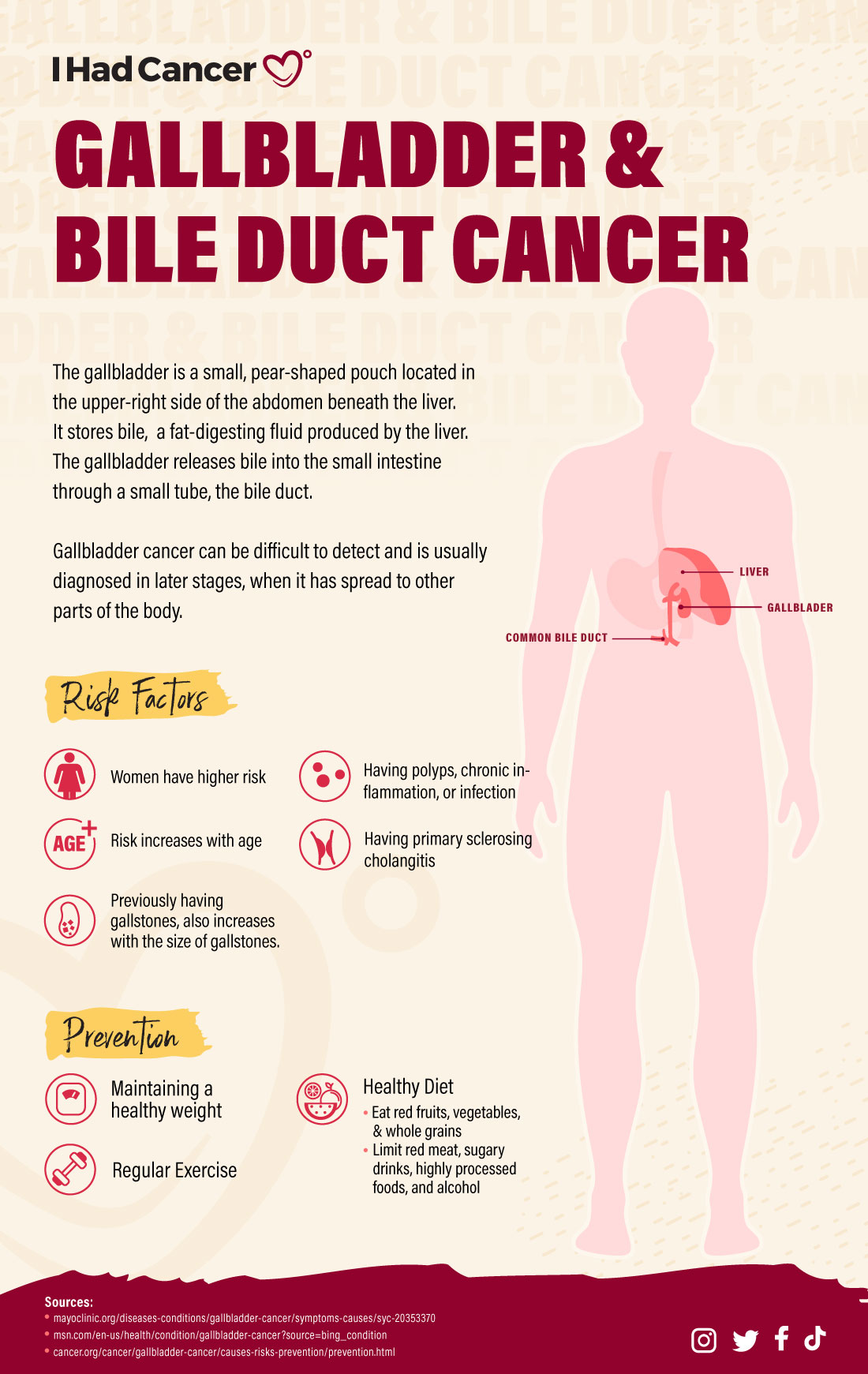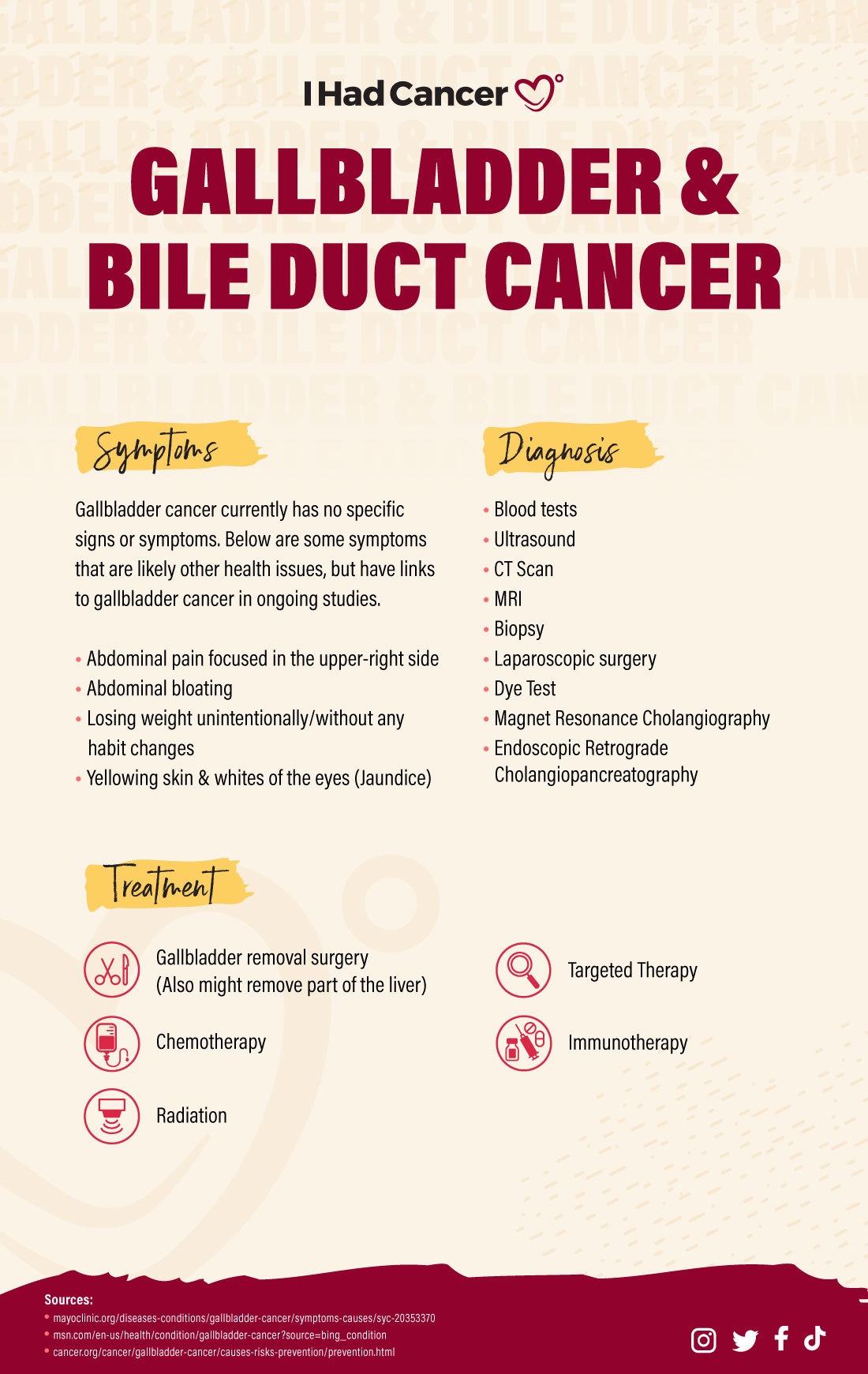Gallbladder & Bile Duct Cancer 101
Learn about different types of cancer through IHadCancer's "Cancer 101" series. Scroll down for information on Gallbladder and Bile Duct Cancer & where to find support if you are a cancer thriver.
What is Gallbladder and Bile Duct Cancer?
The Gallbladder is a small, pear-shaped pouch located in the upper-right side of the abdomen beneath the liver. It stores bile, a fluid produced by the liver that helps digest fat. The gallbladder releases bile into the small intestine through a small tube, the bile duct.
Gallbladder or Bile Duct cancer occurs when there are cancerous cells in either of these structures multiplying rapidly. Neither are common forms of cancer, and both have good prognoses if detected early.
Unfortunately, Gallbladder & Bile Duct cancers are usually discovered in late stages, resulting in fewer treatment options. Since both body parts are small/hidden by other organs, it is easier for the cancer tumor to grow without being detected.
How is Gallbladder/Bile Duct Cancer diagnosed?
- Blood tests evaluating liver function
- Ultrasound
- CT Scan (Computerized Tomography)
- MRI (Magnetic Resonance Imaging)
- Biopsy
If gallbladder/bile duct cancer is confirmed from these tests, the doctor will work to discover what stage the cancer is. These tests include:
- Exploratory surgery:
- Laparoscopic surgery involves inserting a camera through a small cut near the belly button. The doctor uses that camera to view the organs around the gallbladder and see if the initial tumor has spread.
- Tests examining the bile ducts:
- The doctor will inject dye into the bile duct, followed by completing an imaging test to track where the dye travels. This test will reveal any blockages in the bile ducts.
- Magnetic Resonance Cholangiography
- Endoscopic Retrograde Cholangiopancreatography
What are some risk factors for Gallbladder/Bile Duct Cancer?
- Gender: Women have a higher risk for gallbladder cancer.
- Age: Risk of gallbladder cancer increases with age.
- History of gallstones: The risk of gallbladder cancer increases for people with a history of gallstones. Risk also increases with the size of previous gallstones.
- Polyps, Chronic Inflammation, and Infection
- Bile duct inflammation: Primary sclerosing cholangitis causes inflammation of the ducts that drain bile from the gallbladder and liver, and increases the risk of gallbladder cancer.
What are the best ways to prevent Gallbladder/Bile Duct Cancer?
- Maintaining a healthy weight
- Regular physical activity
- Healthy diet
- Increasing consumption of fruits, vegetables, & whole grains
- Limit consumption of red & processed meats, sugary drinks, & highly processed foods
- Limit consumption of alcoholic drinks
What are some symptoms of Gallbladder/Bile Duct Cancer?
There are no specific signs and symptoms of gallbladder cancer. We’ve included some general symptoms that are likely other health issues but have been linked to gallbladder cancer in ongoing studies.
- Abdominal pain focused on the upper-right side
- Abdominal bloating
- Losing weight unintentionally/without any habit changes
- Yellowing skin & whites of the eyes (Jaundice)
What are typical treatments for Gallbladder/Bile Duct Cancer?
- Gallbladder removal surgery (Cholecystectomy)
- Also might require the removal of part of the liver
- Chemotherapy
- Radiation
- Targeted Therapy
- Immunotherapy
Gallbladder & Bile Duct Cancer Infographics
 |  |
IHadCancer Gallbladder/Bile Duct Cancer Community Member Blogs:
- This Can't Be Happening To Me
- He Must Have A Cold - Journal Entry
- Unexpected Challenge - Journal Entry
I'm a Gallbladder and Bile Duct Cancer Fighter/Survivor/Thriver and I need support. Where do I go?
Gallbladder & Bile Duct Cancer Awareness:
February is Gallbladder & Bile Duct Cancer Awareness Month and the color is green. Raise awareness by participating in local events and sharing your story. If you'd like to share your story on IHadCancer.com, email blog@ihadcancer.com.








Team I Had Cancer is the group of people behind the scenes, making sure IHadCancer.com is running, and that you're connecting to the people you need to know for the support and information you need while dealing with cancer.